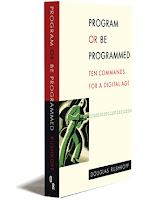Blogs get a bad rap. Of course, their bad reputation is not unwarranted. There are quite a number that are pretty frivolous and don't have much substance (although those can be fairly amusing)--like this blog, for instance. Sometimes, people use their blogs as an online journal, which is perfectly great, but it's not very enlightening for anyone other than family and friends. There are, however, more serious blogs that aim to tackle world issues, keep up with political movements, or analyze classic literature. I think these more serious blogs, with authors who are legitimately trying to reach out, share thought-provoking ideas, and collaborate with other great minds, deserve our attention and our respect.
In chapter 4 of the ebook Writing about Literature in the Digital Age, Ashley Nelson analyzes James Joyce's Dubliners. She talks about her search for information and about how blogs and fan fiction were actually influential in her analysis. Nelson admits that it's probably not the wisest idea to add a blog to your Works Cited page at the end of your 15 page research paper, but why not? As we are moving even further into a world of ebooks, Wikipedia, and even the blogosphere, why can't we use some blogs as a source of information?
Yes, we have to be careful which blogs we are using, even if we are simply using a blog as a springboard for our research. Then again, you have to be careful which book you're using, or which scholarly article you're quoting from. All research must be taken with a grain of salt, including blogs (although we may have to use a pinch or two when it comes to blogs).
In chapter 4 of the ebook Writing about Literature in the Digital Age, Ashley Nelson analyzes James Joyce's Dubliners. She talks about her search for information and about how blogs and fan fiction were actually influential in her analysis. Nelson admits that it's probably not the wisest idea to add a blog to your Works Cited page at the end of your 15 page research paper, but why not? As we are moving even further into a world of ebooks, Wikipedia, and even the blogosphere, why can't we use some blogs as a source of information?
Yes, we have to be careful which blogs we are using, even if we are simply using a blog as a springboard for our research. Then again, you have to be careful which book you're using, or which scholarly article you're quoting from. All research must be taken with a grain of salt, including blogs (although we may have to use a pinch or two when it comes to blogs).
